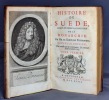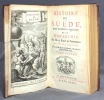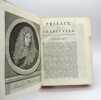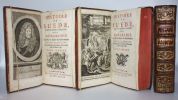12 books for « pufendorf samuel von »Edit
-
Century
17th (3)
18th (3)
20th (1)
-
Topics
Ethic (1)
History (2)
Latin (1)
Law (5)
Philosophy (2)
Sweden (3)
-
Countries
Belgium (1)
Denmark (3)
France (6)
Greece (1)
Switzerland (1)
Le droit de la nature et de gens, ou systeme general des principes le plus importans de la morale, de la jurisprudence, et de la politique. Traduit du Latin par Jean Barbeyrac. Second edition, revûé & augmentée considerablement - [THE STATE OF NATURE IS PEACE]
Amsterdam, Pierre de Coup, 1712. 4to. In contemporary full calf with five raised bands. Binding with considerable wear, scratches, wormholes and stains to boards, upper and lower compartment on spine with loss of leather, corner bumped and with loss of leather, especially upper corner on frontboard. Hinges weak. Small worm-tract to outer margin of first 250 ff., otherwise internally nice and clean. (2), CXXII, (4), 613, (1), (4), 506, (32), 28 pp. + frontispiece.
Second edition of the first French translation of Pufendorf's magnum opus, one of the fundamental works of natural law. In this milestone work of political and legal thought, Pufendorf presents his system of universal law, which profoundly revised the natural law theories of Hobbes and Grotius. In his teaching, that the will of the state is but the sum of the individual wills that constitute it, he shows himself a precursor of Rousseau and of the ""Social Contract"".""It is a complete system of public, private and international law. Against Hobbes's view he contended that the state of nature was one of peace, not war, and heurged the view that international law... existed between all nations... [a work] of great importance"" (David Walker, The Oxford Companion to Law).""In the 'De jure naturae et gentium' Pufendorf took up in great measure the theories of Grotius and sought to complete them by means of the doctrines of Hobbes and of his own ideas. His first important point was that natural law does not extend beyond the limits of this life and that it confines itself to regulating external acts. He disputed Hobbes's conception of the state of nature and concluded that the state of nature is not one of war but of peace. But this peace is feeble and insecure, and if something else does not come to its aid it can do very little for the preservation of mankind.As regards public law Pufendorf, while recognizing in the state (civitas) a moral person (persona moralis), teaches that the will of the state is but the sum of the individual wills that constitute it, and that this association explains the state. In this a priori conception, in which he scarcely gives proof of historical insight, he shows himself as one of the precursors of Rousseau and of the Contrat social. Pufendorf powerfully defends the idea that international law is not restricted to Christendom, but constitutes a common bond between all nations because all nations form part of humanity."" (Encyclopedia Brit.).Graesse V, 504Brunet only mention the later 1720- and 1734-edition.
De Jure Naturae et Gentium Libri octo. Cum Gratia & Privilegio S. Caesareae Majestatis. - [THE STATE OF NATURE IS PEACE]
Londini Scanorum (Lund), Adami Junghaus - Vitus Haberegger, 1672. 4to. Contemporary full calf with double blindstamped borders to boards. Spine restored and hinges weak. Otherwise very nice. Title-page dusty and with a little weakness in the paper, presumably from a removed book-plate on the blank part of verso. Last secion of leaves with some light worming to upper blank margin, far from affecting text. All in all a very nice and clean copy with unusually good margins. Old owner's name to top of title-page. Title-page printed in red/black. (20), 1227,(9) pp.
Scarce first edition of Pufendorf's magnum opus, one of the fundamental works of natural law. In this milestone work of political and legal thought, Pufendorf presents his system of universal law, which profoundly revised the natural law theories of Hobbes and Grotius. In his teaching, that the will of the state is but the sum of the individual wills that constitute it, he shows himself a precursor of Rousseau and of the ""Social Contract"".""It is a complete system of public, private and international law. Against Hobbes's view he contended that the state of nature was one of peace, not war, and heurged the view that international law... existed between all nations... [a work] of great importance"" (David Walker, The Oxford Companion to Law).""In the 'De jure naturae et gentium' Pufendorf took up in great measure the theories of Grotius and sought to complete them by means of the doctrines of Hobbes and of his own ideas. His first important point was that natural law does not extend beyond the limits of this life and that it confines itself to regulating external acts. He disputed Hobbes's conception of the state of nature and concluded that the state of nature is not one of war but of peace. But this peace is feeble and insecure, and if something else does not come to its aid it can do very little for the preservation of mankind.As regards public law Pufendorf, while recognizing in the state (civitas) a moral person (persona moralis), teaches that the will of the state is but the sum of the individual wills that constitute it, and that this association explains the state. In this a priori conception, in which he scarcely gives proof of historical insight, he shows himself as one of the precursors of Rousseau and of the Contrat social. Pufendorf powerfully defends the idea that international law is not restricted to Christendom, but constitutes a common bond between all nations because all nations form part of humanity."" (Encyclopedia Brit.).Collijn: p. 744.
De Jure Naturae et Gentium Libri octo. Cum Gratia & Privilegio S. Caesareae Majestatis. - [THE STATE OF NATURE IS PEACE]
Londini Scanorum (Lund), Adami Junghaus - Vitus Haberegger, 1672. 4to. Contemporary or slightly later full mottled calf five raised bands to richly gilt spine. Edges of boards gilt. Very neat restorations to corners and hinges, barely noticeable. Blank front free end-paper with a few restorations. A mostly faint damp stain inner margin of first section of leaves. Some brownspotting. Title-page printed in red/black. (20), 1227,(9) pp.
Scarce first edition of Pufendorf's magnum opus, one of the fundamental works of natural law. In this milestone work of political and legal thought, Pufendorf presents his system of universal law, which profoundly revised the natural law theories of Hobbes and Grotius. In his teaching, that the will of the state is but the sum of the individual wills that constitute it, he shows himself a precursor of Rousseau and of the ""Social Contract"".""It is a complete system of public, private and international law. Against Hobbes's view he contended that the state of nature was one of peace, not war, and heurged the view that international law... existed between all nations... [a work] of great importance"" (David Walker, The Oxford Companion to Law).""In the 'De jure naturae et gentium' Pufendorf took up in great measure the theories of Grotius and sought to complete them by means of the doctrines of Hobbes and of his own ideas. His first important point was that natural law does not extend beyond the limits of this life and that it confines itself to regulating external acts. He disputed Hobbes's conception of the state of nature and concluded that the state of nature is not one of war but of peace. But this peace is feeble and insecure, and if something else does not come to its aid it can do very little for the preservation of mankind.As regards public law Pufendorf, while recognizing in the state (civitas) a moral person (persona moralis), teaches that the will of the state is but the sum of the individual wills that constitute it, and that this association explains the state. In this a priori conception, in which he scarcely gives proof of historical insight, he shows himself as one of the precursors of Rousseau and of the Contrat social. Pufendorf powerfully defends the idea that international law is not restricted to Christendom, but constitutes a common bond between all nations because all nations form part of humanity."" (Encyclopedia Brit.).Collijn: p. 744.
Les devoirs de l'homme et du citoien tels qu'ils 1735
Pufendorf, Samuel von BaronLes devoirs de l'homme et du citoien tels qu'ils lui sont prescrits par la loi naturelle Tome premier [-second], sixième édition accompagnée comme la précédente des deux discours sur la permission & sur le bénéfice des loix, & du jugement de M. Leibnitz sur cet ouvrage, avec des réflexions du même traducteur mais revue de nouveau et augmentée d'un grand nombre de notesA Amsterdam chez la veuve de P. de Coup & G. Kuyper 1735, XLIX, 523 pp. (pagination continue) 2 vol. In-8°, belle reliure plein veau, un mors partiellement fissuré, coins émoussés, petits manques en coiffes, tranches brique, pages quelques peu roussies.
INTRODUCTION A L HISTOIRE DES PRINCIPAUX ETATS DE L EUROPE, QUI COMPREND L HISTOIRE DE SUEDE , Les guerres qu belle a euës avec ses voisins ; & où l auteur fait voir quels sont les interêts de ce Roiaume à l'égard des autres Puissances de l Europe, Traduite de l'original Allemand de SAMUEL PUFENDORF. Tome III.
Amsterdam Aux depens de la Société 1710 un volume (160 x 90mm), [22] ff. (feuillet blanc, titre, envoi, avis, table, feuillet blanc) 416 pp. Reliure en pleine basane brune, dos à nerfs orné, pièces de titre et tomaison en maroquin rouge, roulette dorée sur les coupes, tranches rouges, gardes de papier " Grand tourniquet " (reliure époque). (volume légèrement frotté, coiffe en pied manquante, auréole sombre sur le second plat, rousseurs pâles). Tome consacré à l' histoire de la Suède. Vignette de titre.
LE DROIT DE LA NATURE ET DES GENS, ou Systeme general Des Principes les plus importans de la morale, de la jurisprudence, et de la politique. Traduit du Latin par JEAN BARBEYRAC. Avec des Notes du Traducteur, où il est supplée, explique, défend et critique les pensées de l'Auteur : et une Préface, qui sert d'introduction à tout l'Ouvrage. (Tomes I-II)
A AMSTERDAM, Chez HENRI SCHELTE, 1706 0 Deux tomes en un fort volume in-4° (250 x 195mm), * 3, [1] ff., 550 pp. - [1] ff. bl., * 2, 472 pp., [18] ff. (table des auteurs, errata) [1] ff. bl. Reliure en basane marbrée brune, dos à nerfs orné, roulette dorée sur les coupes, tranches marbrées (reliure époque). (dos légèrement frotté, charnières fendillées, découpe sur le bas du titre, feuillets brunis, présence de rousseurs, rares salissures, auréole en bordure des feuillets d'errata). Titre en rouge et noir. Bandeau gravé.Traduction française par Barbeyrac de cet ouvrage majeur pour l'histoire du droit naturel, inspirateur des Lumières et de Rousseau en particulier. Ex-libris gravé par Wicker d'après Osterlander : " SYMBOLUM BIBLIOTHECA JOANNIS BERNARDI NACK Civis et Mercatoris Francofurtensis ". Rare.
Le Droit de la Nature et des gens ou système général des principes les plus importants de la morale, de la jurisprudence et de la politique [suivi de : ] Oratio Inauguralis de Dignitate et Utilitate Juris ac historiarum
Amsterdam, Pierre de Coup, 1712. 2 vol. in-4, [2]-CXXII-613 pp. + [6]-506-[34]-28 pp., vélin rigide moucheté à petits rabats, dos long, tranches mouchetées (manques et décollements au dos, quelques rousseurs et taches).
Deuxième édition de la traduction française faite par Jean Barbeyrac. [suivi de : ] Deuxième édition du traité de Barbeyrac. Ex-libris du séminaire de Saint Irène de Lyon, gravé par Durand. * Membre du SLAM et de la LILA / ILAB Member. La librairie est ouverte du lundi au vendredi de 14h à 19h. Merci de nous prévenir avant de passer,certains de nos livres étant entreposés dans une réserve.
Histoire de Suède, avant et depuis la fondation de la monarchie. Nouvelle édition, plus correcte que les précédentes, & continuée jusqu'à l'année 1743.
A Amsterdam, Chez Zacharie Chatelain, 1743. 3 volumes in-12 de [2]-XXXVIII-486-[2]; [2]-XXVI-538-[2] et XVI-481-[35-table] pages, demi-basane brune, dos lisses ornés de filets, étoiles et titre dorés, étiquettes de titre marron, de tomaison vertes, tranches jaunes. Infime accroc à une étiquette.
Premier volume illustré d'un portrait gravé de l'auteur au frontispice, répété au volume 3, un autre frontispice, allégorique, ornant le volume 2. Vignettes de titre. L'auteur fut historiographe et conseiller du roi de Suède, c'est dire s'il maîtrisait le sujet...
Le Droit de la nature et des gens, ou Système général des principes les plus importants de la morale, de la jurisprudence et de la politique
Bâles, Emanuel Thourneisen, 1771. 2 vol. in-4, [2]-CIV-[2]-680 pp. 1 pl. + [4]-613-[37]-52 pp., veau marbré brun de l'époque, dos à nerfs orné de caissons dorés, pièce de titre rubis, pièce de tomaison fauve, tranches rouges (épidermures, petits manques, quelques petites taches).
Nouvelle édition traduite, annotée et préfacée (abondamment) par Jean Barbeyrac. Elle est ornée d'un portrait de l'auteur en frontispice gravé par Johann Rudolf Holzhalb et daté de Zurich, 1750. Elle comprend en fin du second volume deux opuscules de Barbeyrac : Oratio inauguralis de dignitate et utilitate juris ac historiarum (en troisième édition) et Oratio de magistratu (deuxième édition), qui ont leur propre pagination mais appartiennent bien, par les cahiers, à l'ouvrage. Cet ouvrage est sans doute le plus célèbre de son auteur, Samuel von Pufendorf. Il le publie alors qu'il est enseignant à l'université de Lund, au Danemark, provoquant une polémique avec des théologiens et des juristes qui finiront par obtenir l'interdiction de l'ouvrage. Voir photographie(s) / See picture(s) * Membre du SLAM et de la LILA / ILAB Member. La librairie est ouverte du lundi au vendredi de 14h à 19h. Merci de nous prévenir avant de passer,certains de nos livres étant entreposés dans une réserve.
De Officio Hominis et Civis juxta Legem Naturalem libri duo [2 volumes] I: Photographic reproduction of the Edition of 1682, II: Translation (into English)
New York, Oxford University Press 1927 Complete in 2 volumes, I: 30 + xxii + 167pp., II: 27 + xii + 152pp., 26cm., publisher's hardcover bindings in brown cloth with some traces of use, in the series "The Classics of International Law" vol.10 (Publicatons of the Carnegie Endowment for International Peace, Division of International Law, Washington), good condition, J101373
Histoire de Suède, avant et depuis la fondation de la monarchie. Nouvelle édition, plus correcte que les précédentes, & continuée jusqu'a l'année 1748.
Amsterdam, Zacharie Chatelain, 1748 ; 3 vol. in-12. 1f.-Frontispice-XXXVIII-486pp. - Front.-1f.-XXVI-538pp. - Front.-1f.-XX-600p.-60pp.-18ff. n. ch. (table). Veau brun marbré, dos à nerfs ornés; pièces de titre et de tomaison en maroquin rouge, tranches rouges. Quelques rares rousseurs, 1 coin émoussé. Bel exemplaire.
Le portrait de Puffendorff en frontispice du tome 1 est répété au tome 3 il a été gravé par Jacob Folkema d'après le tableau de D. Klöker Ehrenstrahl. Le frontispice du tome 2 est un titre allégorique. Dans sa préface l'éditeur, Bruzen de La Martinière, indique qu'il a procédé à une nouvelle traduction et critique celle que Claude Roussel avait donné avant lui (1689), (déjà revue par J.-B. Desroches de Parthenay en 1732). C'est également lui qui a complété les chapitres jusqu'en 1748 et apporté beaucoup de notes ; enfin il propose une traduction inédite d'un texte de Puffendorff : "Critique de l'histoire des révolutions arrivées dans l'Europe.. par Antoine Varillas."
Puffendorf (ou Pufendorf), Samuel Freiherr (Baron) von, 1619- 1681.
Reference : HI104
(1687)
A) Introduction a L'HISTOIRE des principaux etats, tels qu'ils font aujourd'hui l'Europe. B) Suite a l'intr. a l'Histoire des principaux etats de l'Europe. Traduite de l'original allemand par Cl. ROUXEL.
Utrecht, J. Ribbius, 1687, 2 t. in-24o, XX+545+table, 442+table. A' edition francaise de l'historien allemand, un de fondateurs du droit intern. public. Reliure plein veau contemporaine, dos a nerfs decore.

Phone number : 00 30 210 3616330
 Write to the booksellers
Write to the booksellers


![De Jure Naturae et Gentium Libri octo. Cum Gratia & Privilegio S. Caesareae Majestatis. - [THE STATE OF NATURE IS PEACE]. "PUFENDORF, SAMUEL von.](https://static.livre-rare-book.com/pictures/LLX/54537_1_thumb.jpg)
![De Jure Naturae et Gentium Libri octo. Cum Gratia & Privilegio S. Caesareae Majestatis. - [THE STATE OF NATURE IS PEACE]. "PUFENDORF, SAMUEL von.](https://static.livre-rare-book.com/pictures/LLX/54537_2_thumb.jpg)
![De Jure Naturae et Gentium Libri octo. Cum Gratia & Privilegio S. Caesareae Majestatis. - [THE STATE OF NATURE IS PEACE]. "PUFENDORF, SAMUEL von.](https://static.livre-rare-book.com/pictures/LLX/54537_3_thumb.jpg)
![De Jure Naturae et Gentium Libri octo. Cum Gratia & Privilegio S. Caesareae Majestatis. - [THE STATE OF NATURE IS PEACE]. "PUFENDORF, SAMUEL von.](https://static.livre-rare-book.com/pictures/LLX/57075_1_thumb.jpg)
![De Jure Naturae et Gentium Libri octo. Cum Gratia & Privilegio S. Caesareae Majestatis. - [THE STATE OF NATURE IS PEACE]. "PUFENDORF, SAMUEL von.](https://static.livre-rare-book.com/pictures/LLX/57075_2_thumb.jpg)















